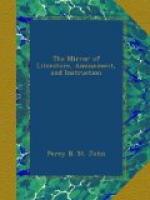France, and Scotland, with many other nobles, and
great estates of divers lands. In the yeere 1362,
the 36th of Edward III., on the first five daies of
May, in Smithfield, were justs holden, the king and
queene being present, with the most part of the chivalry
of England and of France and of other nations; to which
came Spaniards, Cyprians, and Armenians, knightly
requesting ayde of the king of England against the
Pagans, that invaded their confines. The 48th
of Edward III., Dame Alice Perrers, or Pierce, (the
king’s concubine,) as lady of the Sunne, rode
from the Tower of London through Cheape, accompanied
of many lords and ladies, every lady leading a lord
by his horse bridle, till they came into West Smithfield,
and then began a great just, which endured seven daies
after.—In the 14th of Richard II., royal
justs and turnements were proclaimed to be done in
Smithfield, to begin on Sunday next, after the feast
of Saint Michael; many strangers came forth of other
countries, namely, Valarian, Earle of St. Paul, that
had married King Richard’s sister, the Lady
Maud Courtney; and William, the young Earle of Ostervant,
son to Albert of Baviere, Earle of Holland and Henault.
At the day appointed, there issued forth at the Tower,
about the third houre of the day, 60 coursers, apparelled
for the justs, upon every one an esquire of honour
riding a soft pace; then came forth 60 ladies of honour,
mounted upon palfraies, riding on the one side, richly
apparelled, and every lady led a knight with a chain
of gold; those knights, being on the king’s
party, had their armour and apparell garnished with
white harts, and crownes of gold about the harts’
neckes; and so they came riding through the streets
of London to Smithfield, with a great number of trumpets,
&c. The kinge and the queene, who were lodged
in the bishop’s palace of London, were come
from thence, with many great estates, and placed in
chambers, to see the justs. The ladies that led
the knights were taken down from their palfraies,
and went up to chambers prepared for them. Then
alighted the esquires of honour from their coursers,
and the knights in good order mounted upon them; and
after their helmets were set on their heads, and being
ready in all points, proclamation made by the heralds,
the justs began, and many commendable courses were
runne, to the great pleasure of the beholders.
The justs continued many days with great feastings,
as ye may reade in Froisard,” &c. &c.
Smithfield, says Pennant, “was also the spot on which accusations were decided by duel, derived from the Kamp-fight ordeal of the Saxons. I will only (says Mr. P.) mention an instance. It was when the unfortunate armourer entered into the lists, on account of a false accusation of treason, brought against him by his apprentice, in the reign of Henry VI. The friends of the defendant had so plied him with liquor, that he fell an easy conquest to his accuser. Shakspeare has worked this piece of history into a scene, in the second part of Henry




